Ward A.W. The Cambridge History of British Foreign Policy. 1783-1919. Volume 3
Подождите немного. Документ загружается.

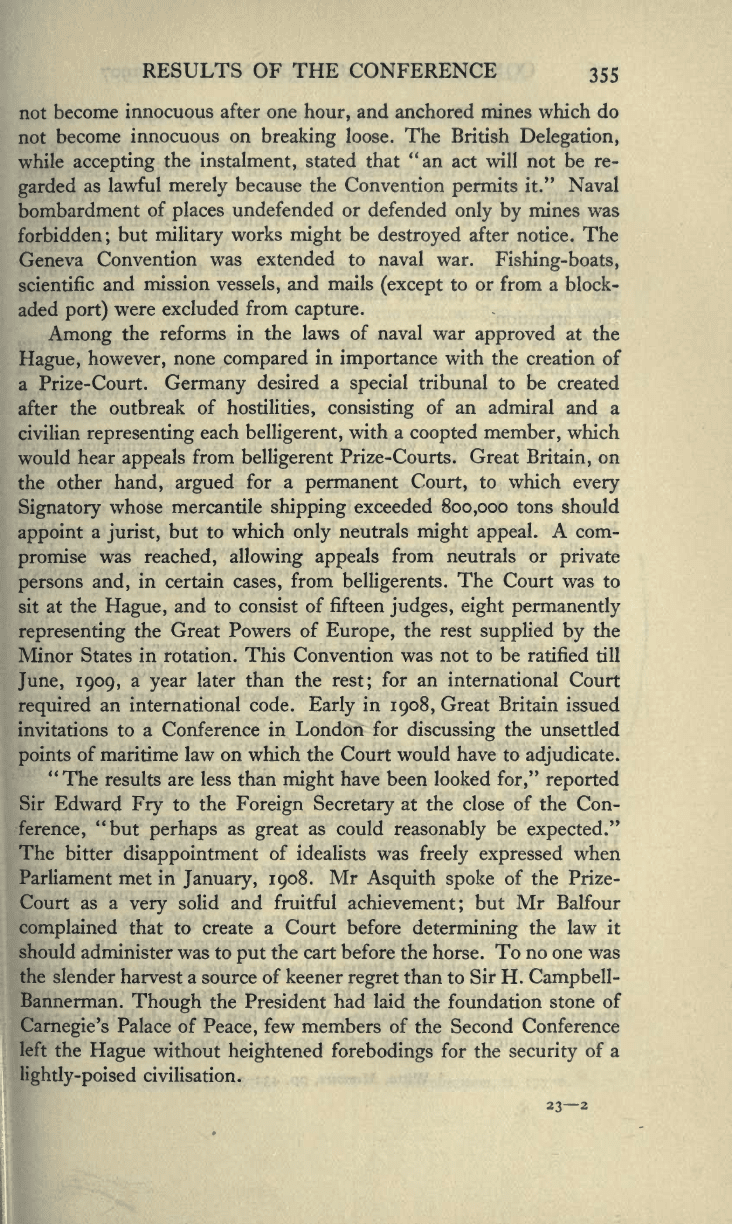
RESULTS OF THE CONFERENCE
355
not
become
innocuous after one
hour,
and anchored mines
which do
not
become
innocuous
on
breaking
loose.
The British
Delegation,
while
accepting
the
instalment,
stated
that
"an
act
will
not
be re-
garded
as
lawful
merely
because the
Convention
permits
it."
Naval
bombardment
of
places
undefended or
defended
only
by
mines
was
forbidden;
but
military
works
might
be
destroyed
after notice. The
Geneva
Convention
was
extended
to
naval war.
Fishing-boats,
scientific
and
mission
vessels,
and mails
(except
to or from a
block-
aded
port)
were
excluded
from
capture.
Among
the
reforms
in
the
laws of naval war
approved
at the
Hague,
however,
none
compared
in
importance
with the creation of
a
Prize-Court.
Germany
desired
a
special
tribunal
to be
created
after
the
outbreak
of
hostilities,
consisting
of an
admiral
and a
civilian
representing
each
belligerent,
with
a
coopted
member,
which
would
hear
appeals
from
belligerent
Prize-Courts. Great
Britain,
on
the
other
hand,
argued
for
a
permanent
Court,
to which
every
Signatory
whose mercantile
shipping
exceeded
800,000
tons
should
appoint
a
jurist,
but to
which
only
neutrals
might
appeal.
A com-
promise
was
reached,
allowing
appeals
from
neutrals or
private
persons
and,
in
certain
cases,
from
belligerents.
The
Court
was
to
sit
at the
Hague,
and
to consist
of
fifteen
judges, eight permanently
representing
the Great
Powers
of
Europe,
the rest
supplied by
the
Minor States
in
rotation.
This Convention
was
not to
be
ratified
till
June,
1909,
a
year
later
than the
rest;
for an
international
Court
required
an
international
code.
Early
in
1908,
Great Britain issued
invitations to
a Conference
in
London
for
discussing
the unsettled
points
of
maritime
law on which
the Court
would have
to
adjudicate.
"The
results are
less
than
might
have been looked
for,"
reported
Sir
Edward
Fry
to the
Foreign Secretary
at the
close of the Con-
ference,
"but
perhaps
as
great
as could
reasonably
be
expected."
The
bitter
disappointment
of
idealists
was
freely expressed
when
Parliament
met
in
January,
1908.
Mr
Asquith
spoke
of the Prize-
Court as a
very
solid and fruitful
achievement;
but
Mr Balfour
complained
that to create a Court before
determining
the
law
it
should
administer was to
put
the cart before the
horse.
To
no
one
was
the
slender
harvest
a
source of keener
regret
than
to Sir
H.
Campbell-
Bannerman.
Though
the President
had
laid
the foundation
stone of
Carnegie's
Palace of
Peace,
few members
of
the
Second
Conference
left
the
Hague
without
heightened
forebodings
for
the
security
of a
lightly-poised
civilisation.
23—2
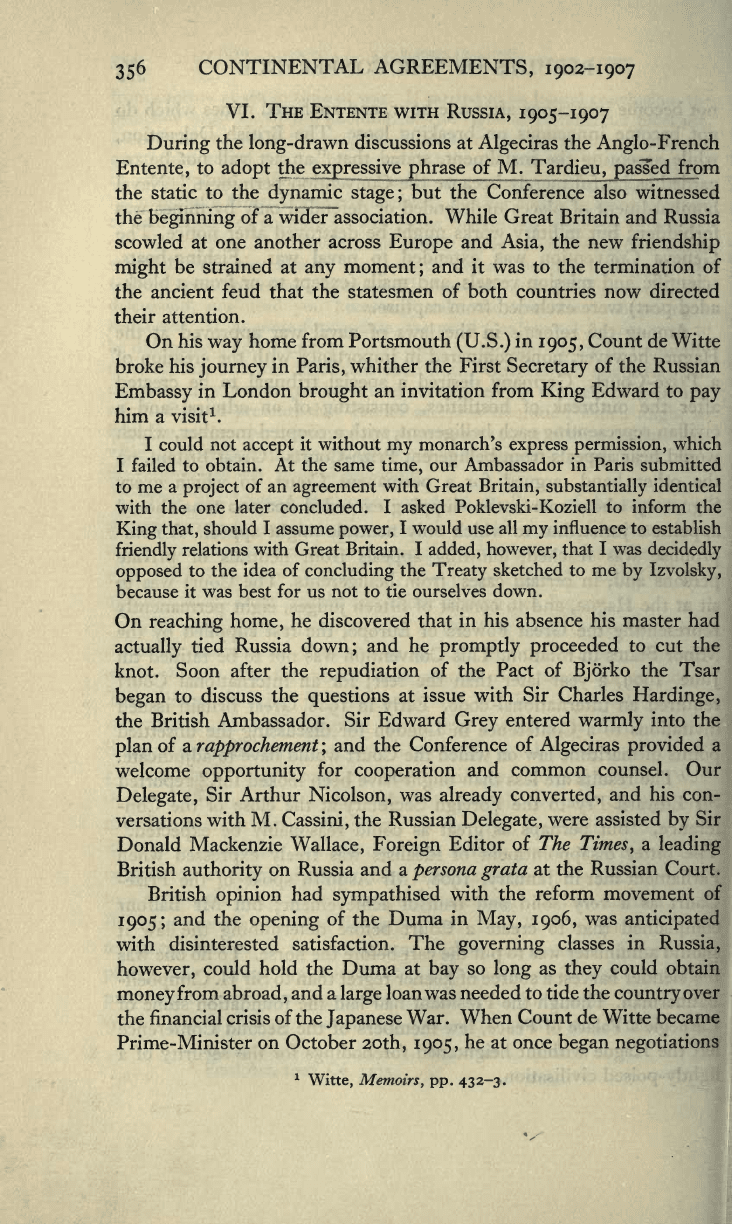
356
CONTINENTAL
AGREEMENTS,
1902-1907
VI.
The Entente with
Russia,
1
905-1907
During
the
long-drawn
discussions
at
Algeciras
the
Anglo-French
Entente,
to
adopt
the
expressive
phrase
of
M.
Tardieu
J
j)asl5edjfrom
the
static to
the
dynamic stage;
but the
Conference
also
witnessed
the
beginning
of a widerassociation. While
Great Britain
and Russia
scowled at one another
across
Europe
and
Asia,
the new
friendship
might
be
strained
at
any
moment;
and
it
was to
the termination
of
the
ancient
feud
that
the statesmen
of
both countries
now
directed
their attention.
On
his
way
home
from
Portsmouth
(U.S.)
in
1905,
Count
de
Witte
broke
his
journey
in
Paris,
whither the
First
Secretary
of
the Russian
Embassy
in
London
brought
an
invitation
from
King
Edward to
pay
him a
visit
1
.
I could
not
accept
it
without
my
monarch's
express permission,
which
I failed
to obtain.
At
the same
time,
our Ambassador
in Paris
submitted
to me
a
project
of
an
agreement
with Great
Britain,
substantially
identical
with the one
later
concluded. I asked Poklevski-Koziell
to inform
the
King
that,
should
I
assume
power,
I
would use
all
my
influence
to
establish
friendly
relations
with Great
Britain.
I
added, however,
that
I
was
decidedly
opposed
to
the idea
of
concluding
the
Treaty
sketched to
me
by
Izvolsky,
because
it was
best for us
not to
tie
ourselves down.
On
reaching
home,
he discovered that
in his absence his
master
had
actually
tied
Russia
down;
and he
promptly
proceeded
to cut the
knot.
Soon after the
repudiation
of the Pact
of
Bjorko
the Tsar
began
to
discuss the
questions
at
issue
with
Sir Charles
Hardinge,
the
British
Ambassador.
Sir Edward
Grey
entered
warmly
into the
plan
of
a
rapprochement
;
and the
Conference
of
Algeciras
provided
a
welcome
opportunity
for
cooperation
and
common counsel.
Our
Delegate,
Sir Arthur
Nicolson,
was
already
converted,
and his con-
versations
with
M.
Cassini,
the
Russian
Delegate,
were assisted
by
Sir
Donald
Mackenzie
Wallace,
Foreign
Editor
of
The
Times,
a
leading
British
authority
on Russia and a
persona
grata
at the
Russian Court.
British
opinion
had
sympathised
with the reform movement
of
1905
;
and the
opening
of
the
Duma
in
May,
1906,
was
anticipated
with
disinterested
satisfaction.
The
governing
classes
in
Russia,
however,
could
hold
the Duma at
bay
so
long
as
they
could obtain
money
from
abroad,
and a
large
loanwas
needed to tide the
country
over
the
financial
crisis of
the
Japanese
War.
When Count
de
Witte became
Prime-Minister
on October
20th,
1905,
he
at
once
began
negotiations
1
Witte, Memoirs,
pp. 432-3.
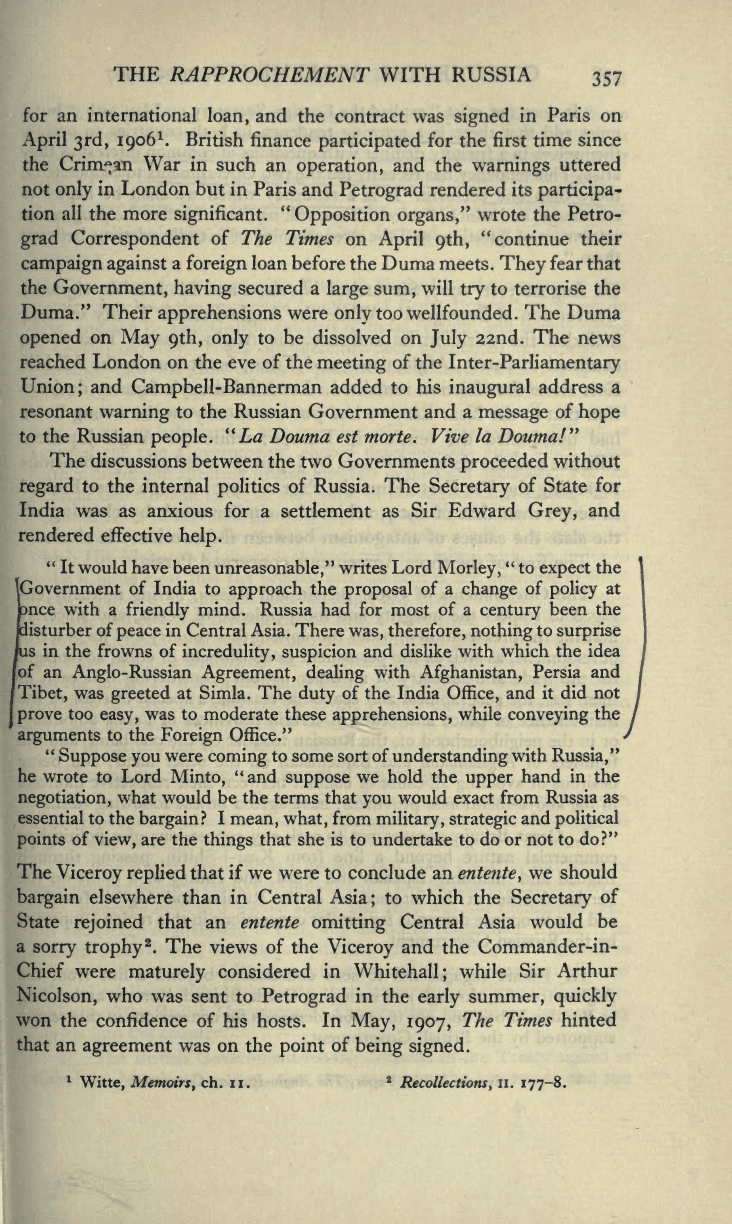
THE
RAPPROCHEMENT WITH
RUSSIA
357
for an international
loan,
and
the
contract
was
signed
in Paris on
April
3rd, 1906
1
.
British
finance
participated
for the first
time
since
the
Crimean
War
in
such
an
operation,
and
the
warnings
uttered
not
only
in London
but
in
Paris and
Petrograd
rendered
its
participa-
tion
all
the more
significant.
"Opposition
organs,"
wrote the
Petro-
grad Correspondent
of
The
Times
on
April
9th,
"continue
their
campaign against
a
foreign
loan
before
the Duma meets.
They
fear that
the
Government,
having
secured
a
large
sum,
will
try
to terrorise the
Duma." Their
apprehensions
were
only
too
wellfounded. The
Duma
opened
on
May 9th, only
to
be
dissolved on
July
22nd.
The news
reached
London
on
the
eve of
the
meeting
of
the
Inter-Parliamentary
Union;
and
Campbell-Bannerman
added
to
his
inaugural
address
a
resonant
warning
to the Russian
Government
and a
message
of
hope
to the Russian
people.
"La
Douma est morte. Vive
la Doutna!"
The
discussions
between the two Governments
proceeded
without
regard
to the internal
politics
of Russia. The
Secretary
of
State
for
India
was as anxious for a
settlement
as Sir Edward
Grey,
and
rendered
effective
help.
"
It would
have been
unreasonable,"
writes
Lord
Morley,
"
to
expect
the
Government of India to
approach
the
proposal
of a
change
of
policy
at
ance with a
friendly
mind. Russia
had for
most
of a
century
been
the
disturber
of
peace
in
Central
Asia. There
was,
therefore,
nothing
to
surprise
us in
the
frowns
of
incredulity, suspicion
and
dislike
with which
the
idea
(of an
Anglo-
Russian
Agreement, dealing
with
Afghanistan,
Persia
and
1
Tibet,
was
greeted
at Simla.
The
duty
of the India
Office,
and
it did
not
J
prove
too
easy,
was
to
moderate
these
apprehensions,
while
conveying
the
arguments
to the
Foreign
Office."
"
Suppose you
were
coming
to some sort of
understanding
with
Russia,"
he
wrote
to
Lord
Minto,
"and
suppose
we
hold
the
upper
hand
in the
negotiation,
what
would be the
terms
that
you
would
exact
from
Russia
as
essential
to
the
bargain?
I
mean, what,
from
military, strategic
and
political
points
of
view,
are
the
things
that
she
is to
undertake
to do or not
to do?"
The
Viceroy
replied
that
if
we
were
to conclude an
entente,
we
should
bargain
elsewhere
than
in
Central
Asia;
to
which
the
Secretary
of
State
rejoined
that
an entente
omitting
Central
Asia
would
be
a
sorry
trophy
2
.
The
views
of
the
Viceroy
and
the
Commander-in-
Chief
were
maturely
considered
in
Whitehall;
while
Sir
Arthur
Nicolson,
who
was
sent to
Petrograd
in
the
early
summer,
quickly
won
the
confidence
of
his hosts.
In
May,
1907,
The
Times hinted
that an
agreement
was on
the
point
of
being signed.
1
Witte,
Memoirs,
ch. n.
2
Recollections,
II.
177-8.
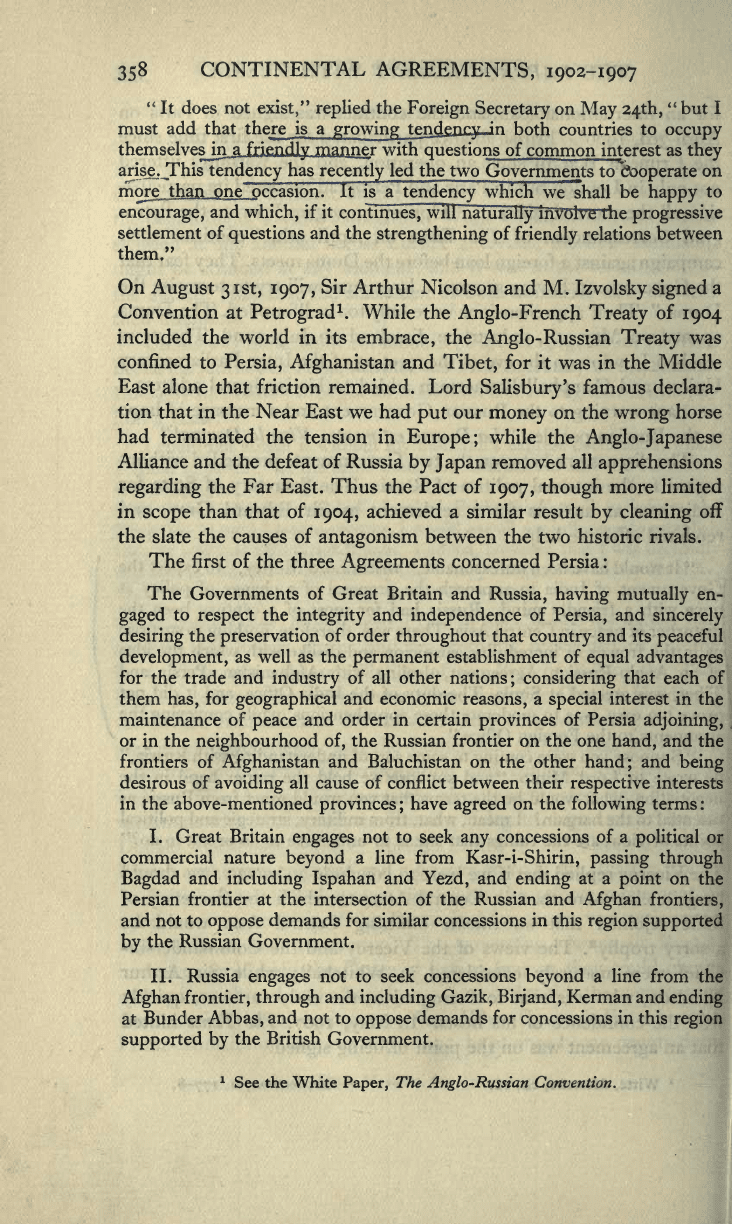
358
CONTINENTAL
AGREEMENTS,
1902-1907
"
It does
not
exist,"
replied
the
Foreign
Secretary
on
May 24th,
"
but
I
must
add that th
ere
is a
growing
te"
^en
r
y
ir>
both
countries
to
occupy
themselvesjn
3
friendly
manner
with
questio
ns of
common
int
erest
as
they
a
rise.
This
ten
dency
has
recently
led the
two
Governments
to
Cooperate
on
mo
re
than one o
ccasion. It
is
a
tendency
which
we shall
be
happy
to
encourage,
and
which,
if
it
continues,
will
naturally
involve the
progressive
settlement of
questions
and
the
strengthening
of
friendly
relations
between
them."
On
August 31st,
1907,
Sir
Arthur Nicolson and
M.
Izvolsky
signed
a
Convention
at
Petrograd
1
. While
the
Anglo-French
Treaty
of
1904
included
the
world in
its
embrace,
the
Anglo-Russian Treaty
was
confined
to
Persia,
Afghanistan
and
Tibet,
for
it
was
in
the
Middle
East
alone
that
friction
remained. Lord
Salisbury's
famous
declara-
tion
that
in
the
Near
East
we had
put
our
money
on
the
wrong
horse
had
terminated
the tension
in
Europe;
while
the
Anglo-
Japanese
Alliance and
the defeat
of
Russia
by Japan
removed all
apprehensions
regarding
the
Far
East. Thus
the Pact
of
1907, though
more limited
in
scope
than that
of
1904,
achieved a
similar result
by
cleaning
off
the
slate the
causes of
antagonism
between the
two
historic
rivals.
The
first
of
the three
Agreements
concerned Persia :
The Governments
of
Great Britain and
Russia,
having mutually
en-
gaged
to
respect
the
integrity
and
independence
of
Persia,
and
sincerely
desiring
the
preservation
of
order
throughout
that
country
and
its
peaceful
development,
as well as
the
permanent
establishment
of
equal
advantages
for
the trade
and
industry
of all
other
nations;
considering
that
each
of
them
has,
for
geographical
and
economic
reasons,
a
special
interest in the
maintenance
of
peace
and order in
certain
provinces
of
Persia
adjoining,
or in
the
neighbourhood
of,
the Russian frontier on the one
hand,
and the
frontiers
of
Afghanistan
and
Baluchistan
on
the other
hand;
and
being
desirous
of
avoiding
all cause of
conflict between
their
respective
interests
in
the
above-mentioned
provinces
;
have
agreed
on
the
following
terms :
I. Great
Britain
engages
not to seek
any
concessions
of a
political
or
commercial nature
beyond
a
line
from
Kasr-i-Shirin,
passing
through
Bagdad
and
including Ispahan
and
Yezd,
and
ending
at a
point
on
the
Persian
frontier at
the intersection
of
the Russian
and
Afghan
frontiers,
and not to
oppose
demands for
similar concessions
in this
region
supported
by
the
Russian
Government.
II.
Russia
engages
not to
seek
concessions
beyond
a line
from the
Afghan
frontier,
through
and
including
Gazik,
Birjand,
Kerman
and
ending
at Bunder
Abbas,
and
not to
oppose
demands
for
concessions in
this
region
supported
by
the
British
Government.
1
See the
White
Paper,
The
Anglo-Russian
Convention.
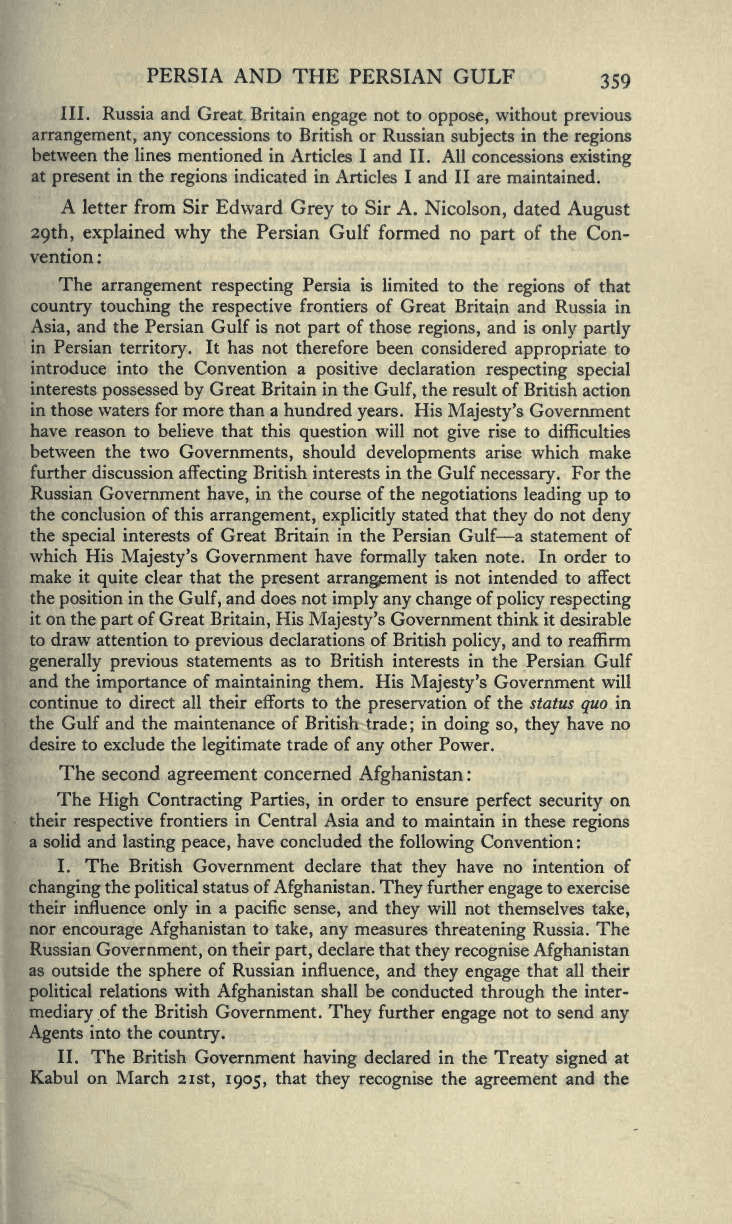
PERSIA
AND
THE
PERSIAN GULF
359
III. Russia and
Great
Britain
engage
not to
oppose,
without
previous
arrangement,
any
concessions
to
British or
Russian
subjects
in
the
regions
between the lines
mentioned in
Articles I
and II. All
concessions
existing
at
present
in
the
regions
indicated in
Articles
I
and II
are maintained.
A
letter
from Sir
Edward
Grey
to
Sir
A.
Nicolson,
dated
August
29th,
explained
why
the
Persian
Gulf
formed no
part
of
the
Con-
vention :
The
arrangement
respecting
Persia is
limited
to the
regions
of
that
country touching
the
respective
frontiers of
Great
Britain
and
Russia
in
Asia,
and
the Persian Gulf
is
not
part
of
those
regions,
and
is
only partly
in Persian
territory.
It
has not
therefore
been considered
appropriate
to
introduce into
the Convention
a
positive
declaration
respecting special
interests
possessed by
Great Britain in
the
Gulf,
the
result
of
British action
in
those waters for
more
than a
hundred
years.
His
Majesty's
Government
have
reason to
believe
that this
question
will
not
give
rise to
difficulties
between
the
two
Governments,
should
developments
arise which
make
further discussion
affecting
British
interests
in
the Gulf
necessary.
For
the
Russian
Government
have,
in
the course of the
negotiations leading up
to
the
conclusion of this
arrangement,
explicitly
stated that
they
do not
deny
the
special
interests
of
Great Britain
in
the Persian Gulf
—
a
statement
of
which
His
Majesty's
Government have
formally
taken note.
In
order
to
make
it
quite
clear that the
present
arrangement
is not
intended
to
affect
the
position
in
the
Gulf,
and
does not
imply any change
of
policy respecting
it on
the
part
of
Great
Britain,
His
Majesty's
Government think it
desirable
to draw attention to
previous
declarations of
British
policy,
and
to
reaffirm
generally previous
statements as to
British interests in
the Persian Gulf
and
the
importance
of
maintaining
them.
His
Majesty's
Government will
continue to direct all their efforts to
the
preservation
of
the status
quo
in
the Gulf
and
the maintenance
of
British
trade;
in
doing
so,
they
have
no
desire
to
exclude the
legitimate
trade
of
any
other
Power.
The second
agreement
concerned
Afghanistan
:
The
High
Contracting
Parties,
in
order
to
ensure
perfect
security
on
their
respective
frontiers
in
Central Asia and
to
maintain in
these
regions
a
solid and
lasting
peace,
have concluded
the
following
Convention:
I. The
British
Government declare that
they
have no intention of
changing
the
political
status
of
Afghanistan.
They
further
engage
to
exercise
their influence
only
in a
pacific
sense,
and
they
will not
themselves
take,
nor
encourage Afghanistan
to
take,
any
measures
threatening
Russia.
The
Russian
Government,
on their
part,
declare that
they recognise Afghanistan
as
outside the
sphere
of Russian
influence,
and
they engage
that all their
political
relations
with
Afghanistan
shall
be
conducted
through
the
inter-
mediary
of
the British
Government.
They
further
engage
not to send
any
Agents
into the
country.
II.
The
British
Government
having
declared in the
Treaty signed
at
Kabul on March
21st,
1905,
that
they
recognise
the
agreement
and the
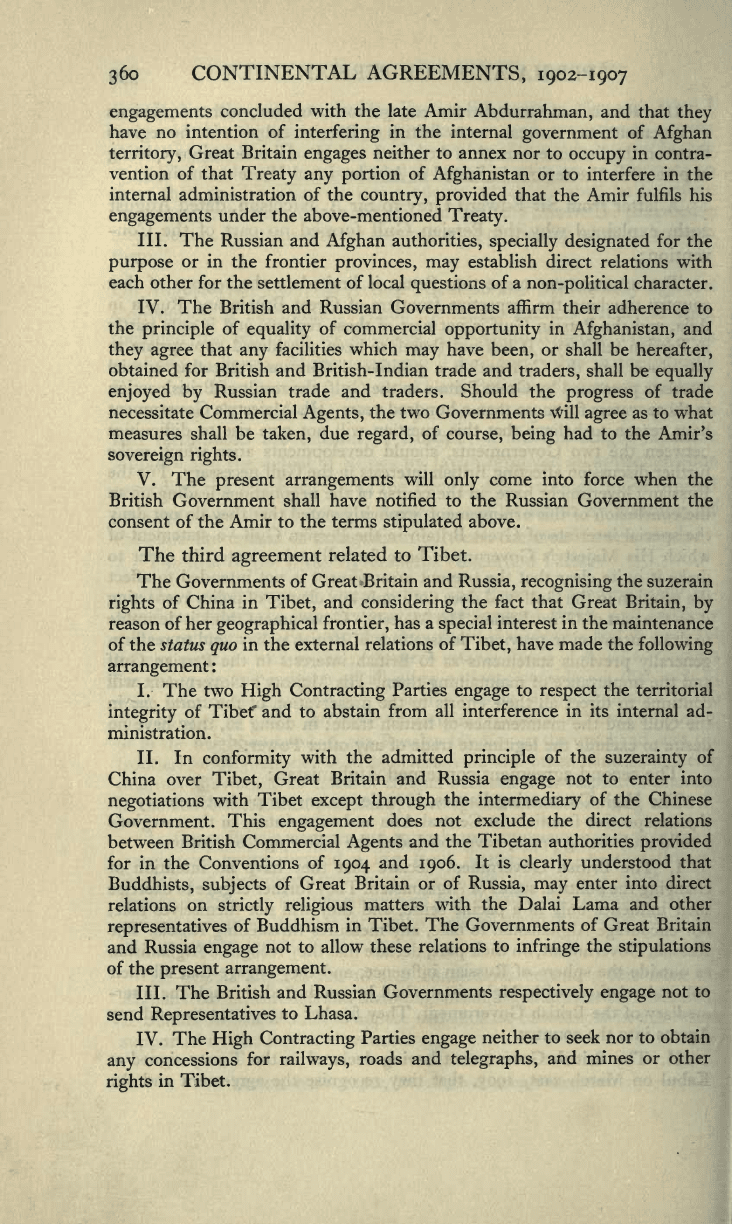
360
CONTINENTAL
AGREEMENTS,
1902-1907
engagements
concluded
with
the late
Amir
Abdurrahman,
and that
they
have
no intention
of
interfering
in
the internal
government
of
Afghan
territory,
Great
Britain
engages
neither
to
annex nor
to
occupy
in
contra-
vention
of
that
Treaty any
portion
of
Afghanistan
or to
interfere
in
the
internal administration of the
country, provided
that
the
Amir fulfils his
engagements
under the above-mentioned
Treaty.
III. The Russian
and
Afghan
authorities,
specially
designated
for
the
purpose
or in
the frontier
provinces,
may
establish direct relations with
each
other
for
the settlement
of local
questions
of a
non-political
character.
IV.
The British
and Russian
Governments
affirm
their
adherence
to
the
principle
of
equality
of commercial
opportunity
in
Afghanistan,
and
they agree
that
any
facilities which
may
have
been,
or shall
be
hereafter,
obtained for British and British-Indian
trade
and
traders,
shall
be
equally
enjoyed by
Russian
trade
and
traders. Should
the
progress
of trade
necessitate Commercial
Agents,
the
two
Governments will
agree
as to what
measures
shall
be
taken,
due
regard,
of
course,
being
had to the Amir's
sovereign rights.
V. The
present
arrangements
will
only
come
into
force when
the
British
Government
shall have notified
to
the Russian Government the
consent
of the Amir
to the terms
stipulated
above.
The third
agreement
related to Tibet.
The Governments
of
Great
Britain
and
Russia,
recognising
the suzerain
rights
of
China
in
Tibet,
and
considering
the fact that Great
Britain,
by
reason
of
her
geographical
frontier,
has a
special
interest
in
the maintenance
of
the
status
quo
in the external
relations
of
Tibet,
have made the
following
arrangement
:
I.
The two
High
Contracting
Parties
engage
to
respect
the
territorial
integrity
of
Tibet*
and to abstain
from all
interference
in its
internal
ad-
ministration.
II.
In
conformity
with the admitted
principle
of the
suzerainty
of
China over
Tibet,
Great
Britain and Russia
engage
not to enter into
negotiations
with
Tibet
except through
the
intermediary
of
the
Chinese
Government.
This
engagement
does
not
exclude
the direct relations
between
British
Commercial
Agents
and
the Tibetan authorities
provided
for in the Conventions
of
1904
and
1906.
It is
clearly
understood
that
Buddhists,
subjects
of
Great
Britain or
of
Russia,
may
enter into direct
relations
on
strictly religious
matters with
the Dalai Lama and
other
representatives
of Buddhism
in Tibet. The
Governments
of Great
Britain
and Russia
engage
not
to
allow these relations
to
infringe
the
stipulations
of
the
present
arrangement.
III.
The
British and Russian
Governments
respectively engage
not
to
send
Representatives
to
Lhasa.
IV.
The
High
Contracting
Parties
engage
neither
to seek nor to
obtain
any
concessions
for
railways,
roads
and
telegraphs,
and
mines or
other
rights
in Tibet.
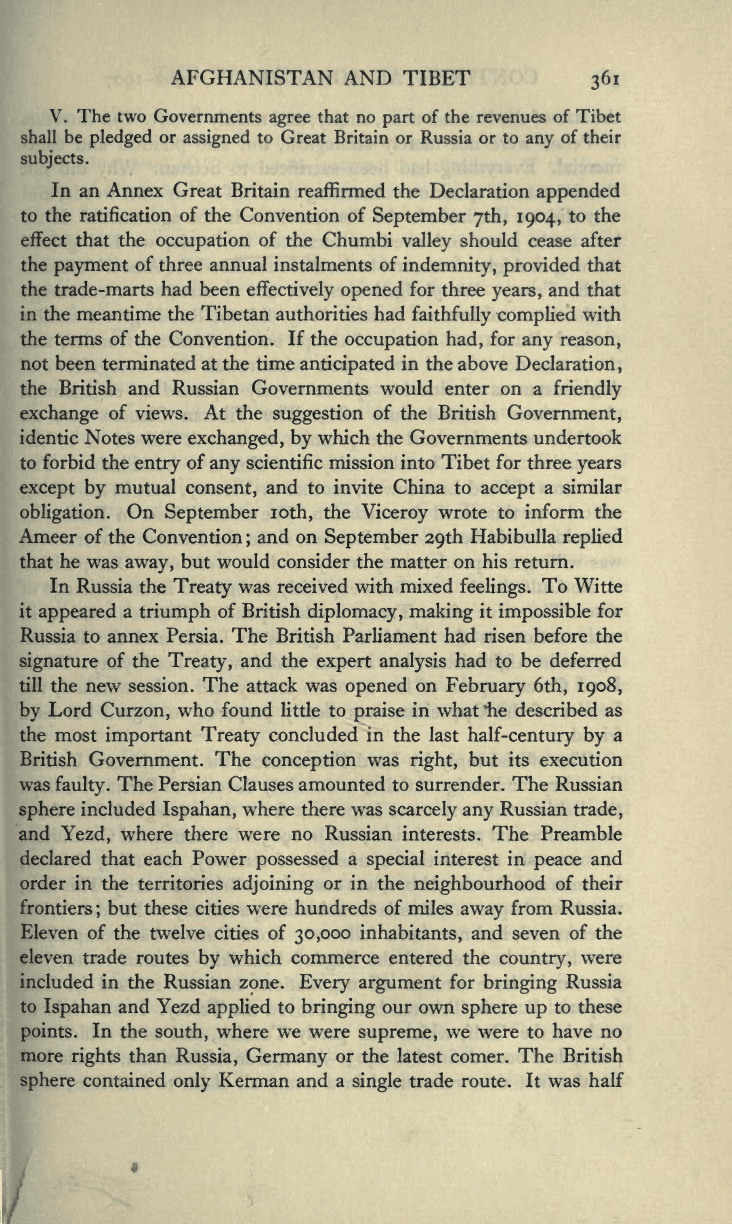
AFGHANISTAN
AND TIBET
361
V.
The
two
Governments
agree
that no
part
of
the revenues
of Tibet
shall be
pledged
or
assigned
to
Great Britain or
Russia
or to
any
of their
subjects.
In an
Annex
Great Britain reaffirmed
the Declaration
appended
to
the
ratification
of
the
Convention of
September 7th,
1904,
to the
effect that
the
occupation
of
the Chumbi
valley
should
cease after
the
payment
of
three
annual
instalments
of
indemnity,
provided
that
the trade-marts
had been
effectively
opened
for
three
years,
and that
in
the
meantime
the
Tibetan authorities
had
faithfully complied
with
the terms
of
the Convention.
If
the
occupation
had,
for
any
reason,
not been
terminated at the
time
anticipated
in
the above
Declaration,
the British
and
Russian
Governments
would
enter
on
a
friendly
exchange
of
views.
At the
suggestion
of
the British
Government,
identic Notes
were
exchanged,
by
which
the Governments undertook
to
forbid
the
entry
of
any
scientific
mission into
Tibet
for
three
years
except by
mutual
consent,
and
to invite
China
to
accept
a similar
obligation.
On
September
10th,
the
Viceroy
wrote to
inform
the
Ameer
of
the Convention
;
and on
September
29th
Habibulla
replied
that he
was
away,
but would
consider
the matter
on his
return.
In
Russia the
Treaty
was
received with mixed
feelings.
To
Witte
it
appeared
a
triumph
of
British
diplomacy, making
it
impossible
for
Russia
to
annex Persia. The British Parliament
had
risen before the
signature
of
the
Treaty,
and
the
expert
analysis
had
to be deferred
till
the new session.
The
attack
was
opened
on
February
6th,
1908,
by
Lord
Curzon,
who found
little to
praise
in
what *he described
as
the
most
important Treaty
concluded in
the
last
half-century
by
a
British Government. The
conception
was
right,
but
its execution
was
faulty.
The Persian Clauses amounted
to surrender.
The Russian
sphere
included
Ispahan,
where
there
was
scarcely
any
Russian
trade,
and
Yezd,
where
there
were
no
Russian
interests. The Preamble
declared
that each
Power
possessed
a
special
interest
in
peace
and
order in
the
territories
adjoining
or in
the
neighbourhood
of
their
frontiers
;
but
these
cities
were
hundreds of
miles
away
from Russia.
Eleven of
the twelve cities of
30,000
inhabitants,
and
seven
of the
eleven
trade routes
by
which commerce entered
the
country,
were
included in
the Russian zone.
Every argument
for
bringing
Russia
to
Ispahan
and Yezd
applied
to
bringing
our
own
sphere
up
to
these
points.
In
the
south,
where
we were
supreme,
we
were
to
have no
more
rights
than
Russia,
Germany
or
the
latest comer.
The British
sphere
contained
only
Kerman
and a
single
trade
route.
It
was half
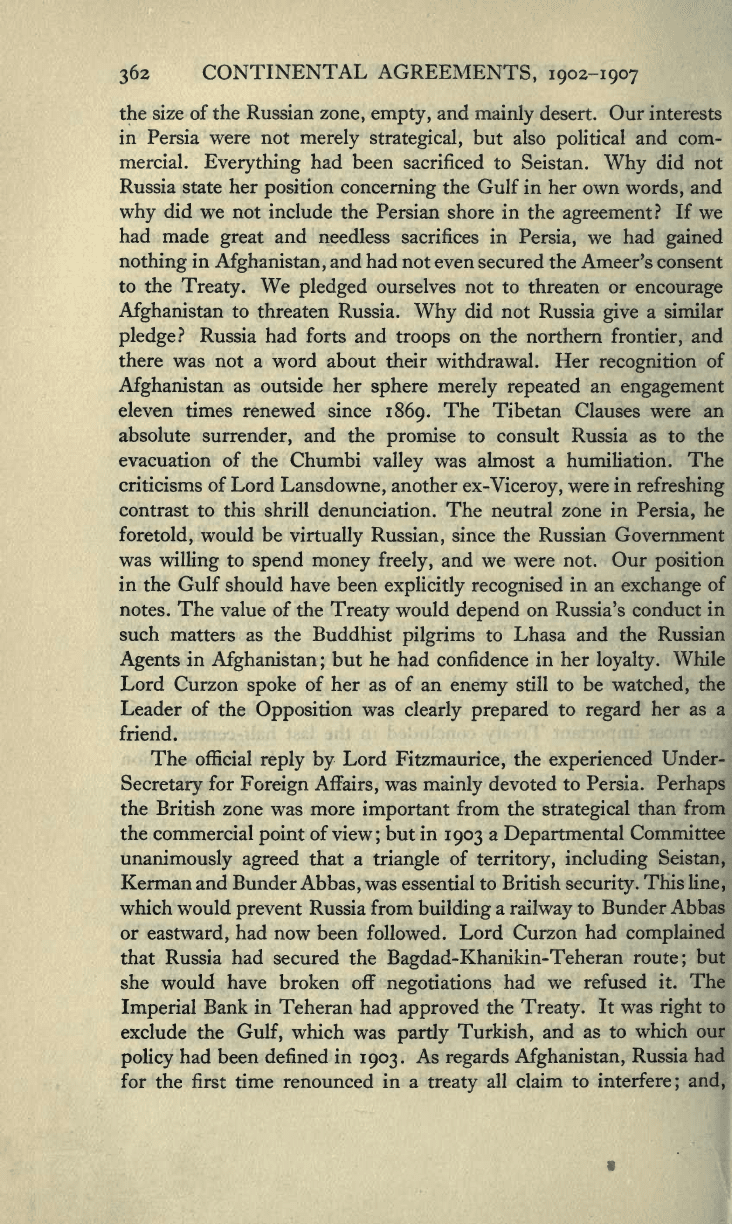
362
CONTINENTAL
AGREEMENTS,
1902-1907
the
size
of
the
Russian
zone,
empty,
and
mainly
desert.
Our
interests
in Persia were
not
merely
strategical,
but also
political
and com-
mercial.
Everything
had
been
sacrificed to
Seistan.
Why
did
not
Russia
state
her
position
concerning
the Gulf in
her own
words,
and
why
did
we
not include
the
Persian
shore
in
the
agreement?
If
we
had
made
great
and
needless sacrifices in
Persia,
we had
gained
nothing
in
Afghanistan,
and
had
not even
secured
the Ameer's consent
to the
Treaty.
We
pledged
ourselves not to
threaten
or
encourage
Afghanistan
to
threaten Russia.
Why
did
not
Russia
give
a similar
pledge?
Russia
had
forts and
troops
on
the northern
frontier,
and
there was
not a word
about their withdrawal. Her
recognition
of
Afghanistan
as
outside her
sphere
merely repeated
an
engagement
eleven
times renewed since
1869.
The Tibetan Clauses were
an
absolute
surrender,
and the
promise
to consult
Russia as to the
evacuation
of
the Chumbi
valley
was
almost
a
humiliation.
The
criticisms
of
Lord
Lansdowne,
another ex-
Viceroy,
were
in
refreshing
contrast to this shrill denunciation. The
neutral zone
in
Persia,
he
foretold,
would be
virtually
Russian,
since the
Russian
Government
was
willing
to
spend
money freely,
and
we were not.
Our
position
in
the
Gulf
should
have
been
explicitly recognised
in an
exchange
of
notes.
The value
of
the
Treaty
would
depend
on Russia's conduct
in
such
matters
as
the Buddhist
pilgrims
to
Lhasa and
the
Russian
Agents
in
Afghanistan
;
but
he
had
confidence
in
her
loyalty.
While
Lord
Curzon
spoke
of her as of an
enemy
still to be
watched,
the
Leader of
the
Opposition
was
clearly prepared
to
regard
her
as a
friend.
The
official
reply by
Lord
Fitzmaurice,
the
experienced
Under-
Secretary
for
Foreign
Affairs,
was
mainly
devoted to
Persia.
Perhaps
the British
zone was more
important
from
the
strategical
than
from
the
commercial
point
of
view;
but
in
1903
a
Departmental
Committee
unanimously
agreed
that
a
triangle
of
territory,
including
Seistan,
Kerman and Bunder
Abbas,
was essential to
British
security.
This
line,
which
would
prevent
Russia from
building
a
railway
to
Bunder
Abbas
or
eastward,
had now
been followed.
Lord Curzon
had
complained
that
Russia had
secured
the
Bagdad-Khanikin-Teheran
route;
but
she
would have broken off
negotiations
had
we
refused
it.
The
Imperial
Bank
in
Teheran
had
approved
the
Treaty.
It
was
right
to
exclude the
Gulf,
which
was
partly
Turkish,
and
as to
which
our
policy
had been defined
in
1903.
As
regards
Afghanistan,
Russia
had
for
the first
time
renounced
in a
treaty
all claim to
interfere;
and,
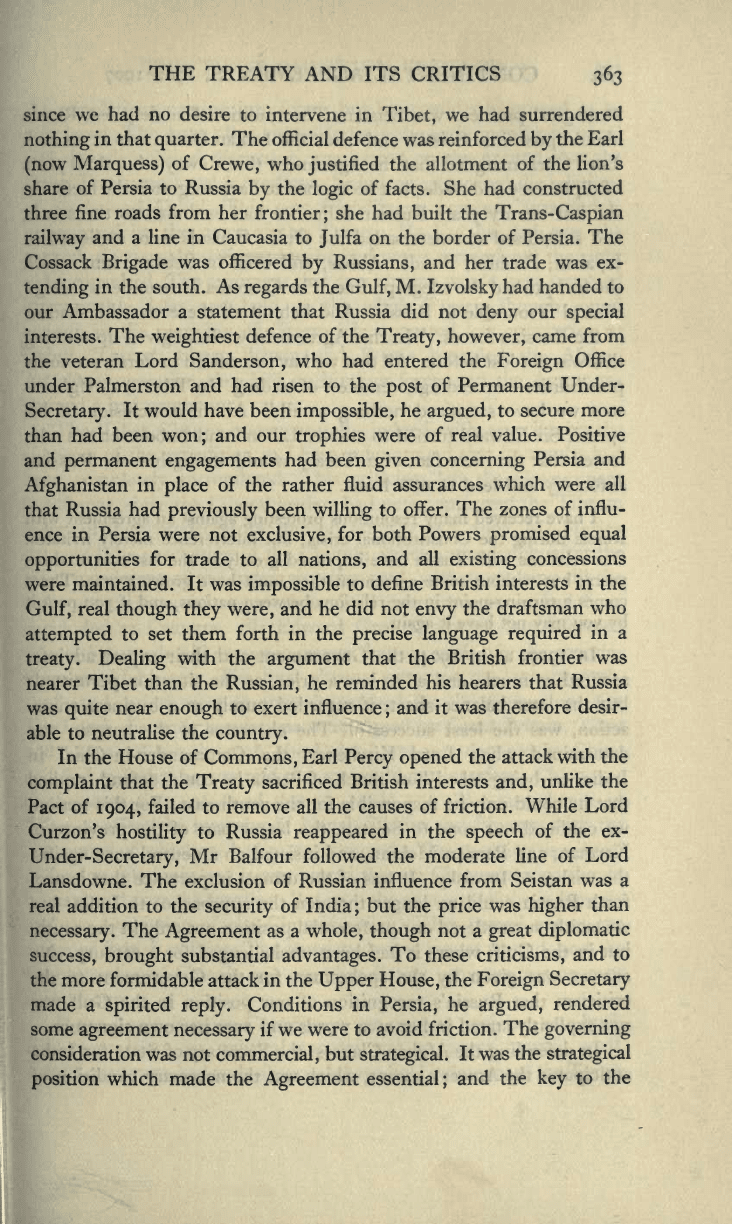
THE
TREATY
AND
ITS
CRITICS
363
since
we had
no
desire
to
intervene
in
Tibet,
we
had surrendered
nothing
in
that
quarter.
The
official
defence
was reinforced
by
the
Earl
(now
Marquess)
of
Crewe,
who
justified
the
allotment
of
the
lion's
share
of Persia to Russia
by
the
logic
of
facts.
She
had
constructed
three
fine
roads from
her
frontier;
she
had
built the
Trans-Caspian
railway
and a
line
in
Caucasia
to
Julfa
on
the
border
of
Persia.
The
Cossack
Brigade
was
officered
by
Russians,
and
her trade
was ex-
tending
in
the
south.
As
regards
the
Gulf,
M.
Izvolsky
had handed
to
our Ambassador
a
statement that
Russia did
not
deny
our
special
interests.
The
weightiest
defence
of
the
Treaty,
however,
came
from
the veteran
Lord
Sanderson,
who
had
entered the
Foreign
Office
under Palmerston
and had risen to
the
post
of
Permanent
Under-
Secretary.
It
would have
been
impossible,
he
argued,
to
secure
more
than
had been
won;
and our
trophies
were
of real value. Positive
and
permanent
engagements
had been
given concerning
Persia
and
Afghanistan
in
place
of
the rather
fluid
assurances
which were all
that
Russia
had
previously
been
willing
to
offer.
The
zones
of influ-
ence in Persia were
not
exclusive,
for
both
Powers
promised equal
opportunities
for
trade to
all
nations,
and all
existing
concessions
were
maintained.
It
was
impossible
to
define British
interests
in
the
Gulf,
real
though
they
were,
and
he
did
not
envy
the draftsman
who
attempted
to set them forth
in
the
precise
language required
in
a
treaty.
Dealing
with the
argument
that
the
British frontier
was
nearer Tibet than the
Russian,
he reminded
his hearers that
Russia
was
quite
near
enough
to exert
influence
;
and it
was
therefore
desir-
able
to
neutralise the
country.
In
the
House of
Commons,
Earl
Percy
opened
the
attack
with
the
complaint
that the
Treaty
sacrificed
British
interests
and,
unlike the
Pact
of
1904,
failed to remove
all the
causes
of
friction.
While
Lord
Curzon's
hostility
to
Russia
reappeared
in
the
speech
of
the
ex-
Under-
Secretary,
Mr Balfour followed the
moderate
line
of Lord
Lansdowne. The exclusion
of Russian influence
from Seistan
was
a
real
addition to
the
security
of
India
;
but the
price
was
higher
than
necessary.
The
Agreement
as a
whole,
though
not
a
great
diplomatic
success,
brought
substantial
advantages.
To
these
criticisms,
and
to
the
more formidable
attack
in
the
Upper
House,
the
Foreign
Secretary
made
a
spirited
reply.
Conditions
in
Persia,
he
argued,
rendered
some
agreement
necessary
if
we were
to
avoid
friction.
The
governing
consideration was
not
commercial,
but
strategical.
It
was
the
strategical
>osition which
made the
Agreement
essential;
and
the
key
to
the
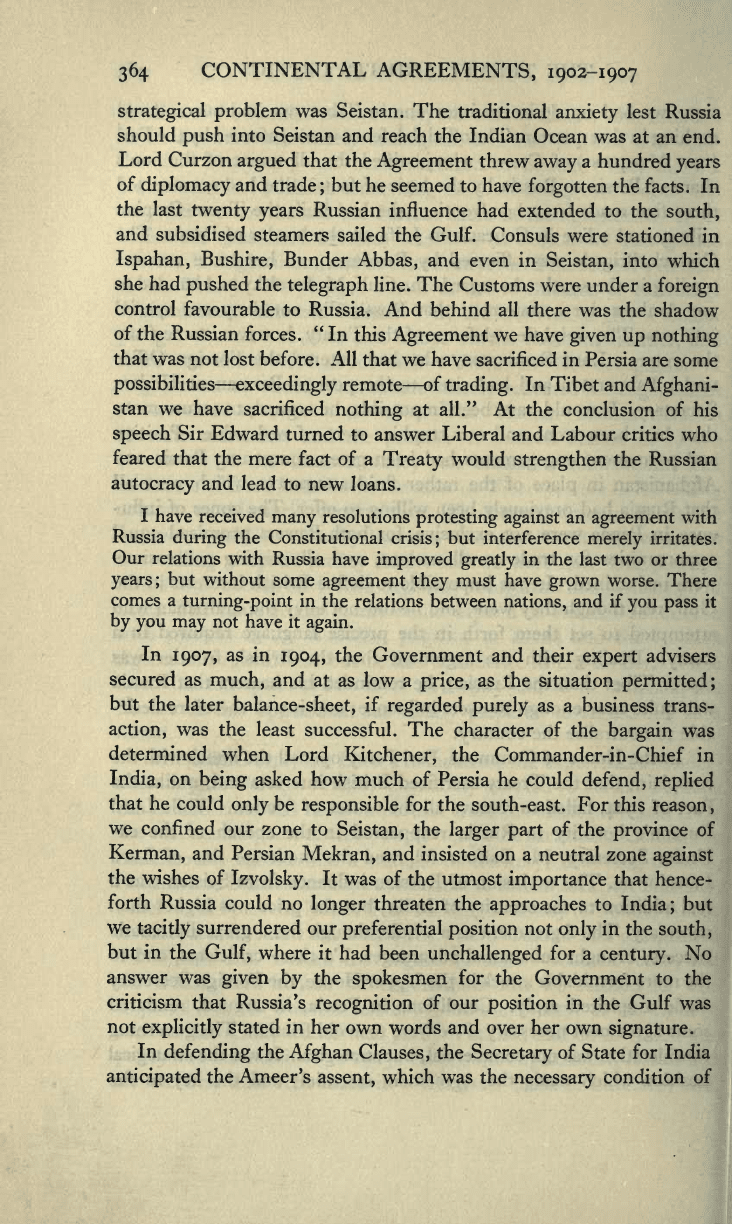
364
CONTINENTAL
AGREEMENTS,
1902-1907
strategical
problem
was
Seistan. The
traditional
anxiety
lest Russia
should
push
into
Seistan and
reach
the Indian
Ocean was at
an
end.
Lord
Curzon
argued
that the
Agreement
threw
away
a
hundred
years
of
diplomacy
and
trade
;
but
he
seemed
to have
forgotten
the
facts. In
the
last
twenty
years
Russian
influence had
extended to the
south,
and
subsidised
steamers
sailed
the
Gulf.
Consuls
were stationed in
Ispahan,
Bushire,
Bunder
Abbas,
and
even
in
Seistan,
into which
she had
pushed
the
telegraph
line. The
Customs
were under a
foreign
control
favourable
to Russia. And behind all
there
was
the shadow
of
the Russian
forces.
"
In
this
Agreement
we
have
given up
nothing
that
was
not
lost
before.
All
that we
have sacrificed in
Persia are
some
possibilities
—
exceedingly
remote
—
of
trading.
In
Tibet and
Afghani-
stan
we have
sacrificed
nothing
at
all."
At the conclusion of
his
speech
Sir
Edward
turned
to answer Liberal and Labour
critics who
feared
that the
mere
fact
of a
Treaty
would
strengthen
the Russian
autocracy
and
lead
to new loans.
I
have
received
many
resolutions
protesting against
an
agreement
with
Russia
during
the
Constitutional
crisis;
but
interference
merely
irritates.
Our
relations with
Russia
have
improved
greatly
in the
last two or three
years;
but
without
some
agreement
they
must have
grown
worse. There
comes a
turning-point
in
the
relations between
nations,
and if
you pass
it
by
you
may
not have it
again.
In
1907,
as
in
1904,
the
Government
and
their
expert
advisers
secured as
much,
and
at as
low a
price,
as the
situation
permitted;
but
the
later
balance-sheet,
if
regarded purely
as a
business trans-
action,
was
the
least successful. The
character
of
the
bargain
was
determined
when Lord
Kitchener,
the
Commander-in-Chief
in
India,
on
being
asked how
much of Persia
he
could
defend,
replied
that he
could
only
be
responsible
for
the
south-east.
For
this
reason,
we
confined
our
zone to
Seistan,
the
larger
part
of
the
province
of
Kerman,
and
Persian
Mekran,
and
insisted
on
a
neutral zone
against
the
wishes
of
Izvolsky.
It was of
the utmost
importance
that
hence-
forth Russia could
no
longer
threaten the
approaches
to
India;
but
we
tacitly
surrendered our
preferential position
not
only
in
the
south,
but
in
the
Gulf,
where
it
had
been
unchallenged
for a
century.
No
answer was
given
by
the
spokesmen
for
the
Government
to
the
criticism
that
Russia's
recognition
of our
position
in
the
Gulf
was
not
explicitly
stated in
her own
words
and
over her own
signature.
In
defending
the
Afghan
Clauses,
the
Secretary
of
State
for
India
anticipated
the Ameer's
assent,
which
was
the
necessary
condition
of
